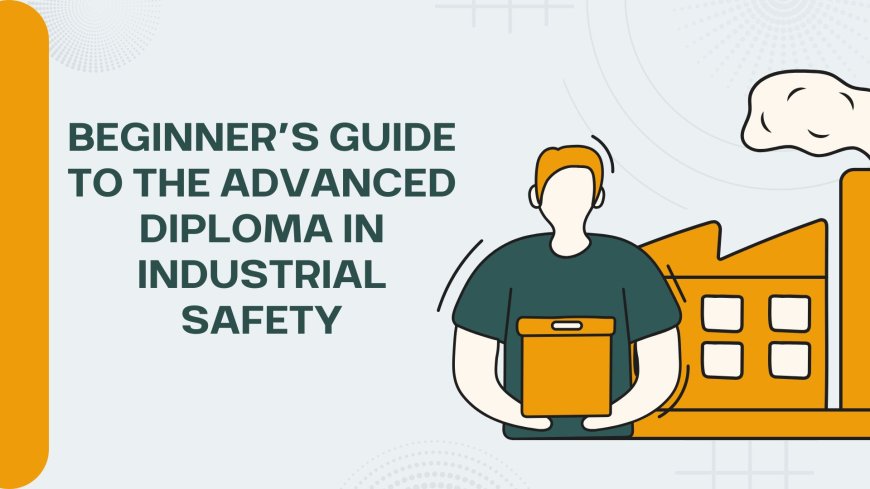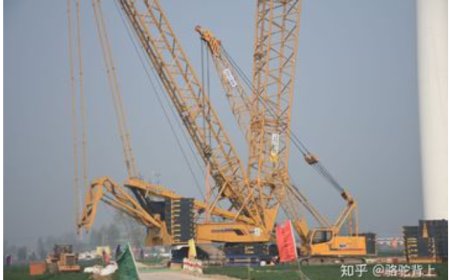Beginner’s Guide to the Advanced Diploma in Industrial Safety
This beginner’s guide aims to provide a comprehensive overview of what the Advanced Diploma in Industrial Safety is.

Introduction
Industrial safety is an essential component of every industry, especially those that operate in hazardous environments such as manufacturing, construction, oil & gas, pharmaceuticals, and chemicals. With the growing emphasis on workplace safety and regulatory compliance, the Advanced Diploma in Industrial Safety (ADIS) has emerged as a preferred qualification for professionals aspiring to build a career in safety management.
This beginners guide aims to provide a comprehensive overview of what the Advanced Diploma in Industrial Safety is, who its for, its key benefits, eligibility criteria, subjects covered, career opportunities, and tips to get started.
What is the Advanced Diploma in Industrial Safety?
The Advanced Diploma in Industrial Safety is a specialized academic program designed to equip students and working professionals with in-depth knowledge and practical skills in occupational health and safety, risk management, accident prevention, fire safety, and environmental protection.
The course typically spans 1 year and is offered by various institutes across India and abroad. It focuses on helping learners understand the legal, technical, and managerial aspects of industrial safety.
Who Should Enroll?
This program is ideal for:
-
Engineering graduates (Mechanical, Electrical, Civil, Chemical, etc.)
-
Diploma holders in engineering fields
-
Safety officers or HSE professionals looking to upgrade their skills
-
Supervisors and managers responsible for workplace safety
-
Individuals looking for career opportunities in industrial safety
Whether you are just starting your career or aiming to move into a specialized safety role, the ADIS course can provide the required credentials and knowledge.
Eligibility Criteria
The eligibility requirements may vary slightly depending on the institution, but generally include:
-
Educational Qualification: A diploma or degree in engineering or science
-
Work Experience: Some institutes may require 1-2 years of industrial experience
-
Age Limit: Usually no strict age restriction, but some institutes prefer candidates under 35
-
Language Proficiency: Ability to understand and communicate in English, as most programs are taught in English
Key Subjects Covered
The ADIS curriculum is designed to cover a wide range of topics, ensuring that students develop a holistic understanding of industrial safety. Common subjects include:
-
Fundamentals of Industrial Safety
-
Occupational Health and Hygiene
-
Fire Prevention and Protection
-
Electrical and Mechanical Safety
-
Construction Safety
-
Hazard Identification and Risk Assessment (HIRA)
-
Safety Management Systems
-
Environmental Safety and Waste Management
-
Legal Framework and Safety Laws (Factories Act, OSHA, etc.)
-
Disaster Management and Emergency Planning
Some courses may also include practical training, industry visits, project work, and seminars.
Mode of Learning: Residential vs Distance Education
The ADIS is available in both residential (classroom-based) and distance learning formats.
-
Residential Programs: Offer hands-on experience, interaction with faculty, and real-time learning.
-
Distance Learning: Ideal for working professionals who want flexibility and wish to continue working while studying.
Each mode has its pros and cons, and the choice depends on your personal and professional circumstances.
Benefits of Pursuing ADIS
-
Enhanced Employability: Industries prefer candidates with formal safety qualifications.
-
Career Growth: Opens doors to higher positions like Safety Manager, HSE Officer, etc.
-
Regulatory Compliance Knowledge: Understand workplace safety laws and standards.
-
Global Opportunities: Recognized by industries worldwide, especially in the Middle East and Gulf countries.
-
Professional Recognition: Adds value to your resume and professional profile.
-
Safety Culture Advocacy: Enables you to promote a strong safety culture in your organization.
Career Opportunities After ADIS
Graduates of ADIS can pursue careers in a wide range of sectors including:
-
Manufacturing and Heavy Engineering
-
Oil & Gas and Petrochemicals
-
Construction and Infrastructure
-
Pharmaceuticals and Chemicals
-
Power Plants and Refineries
-
Government and Public Sector Enterprises
Common Job Roles Include:
-
Safety Officer
-
HSE Engineer
-
Fire & Safety Supervisor
-
Environment, Health & Safety (EHS) Officer
-
Risk Assessor
-
Compliance Officer
With experience, one can rise to senior roles like HSE Manager, Safety Consultant, or Corporate Safety Head.
Certifications and Further Studies
After completing ADIS, candidates often pursue additional certifications for career advancement:
-
NEBOSH (UK)
-
IOSH Managing Safely
-
OSHA (USA) Certification
-
Lead Auditor Courses (ISO 45001)
-
Postgraduate Diploma in Industrial Safety or Fire Safety
These additional qualifications help in specializing further and exploring international job markets.
Tips for Beginners
-
Choose a Recognized Institute: Ensure the institute is recognized by AICTE, DGFASLI, or other relevant authorities.
-
Understand the Curriculum: Look for a course that balances theory and practical learning.
-
Network with Industry Professionals: Join LinkedIn groups or forums related to industrial safety.
-
Stay Updated with Safety Regulations: Read about new safety laws, industry standards, and international guidelines.
-
Focus on Practical Knowledge: Try to get hands-on experience or internships during or after your course.
-
Prepare for Interviews: Safety roles often require strong understanding of risk assessment, audits, and compliance.
Note: For career growth visit best Institute of Fire Engineering and Safety Management
Conclusion
The Advanced Diploma in Industrial Safety is a career-defining qualification that opens the door to numerous opportunities in the safety and health domain. It is especially valuable in today's world where safety regulations are stringent, and employers seek qualified professionals to manage risks and prevent workplace hazards.
Whether you're just starting your journey or looking to upgrade your current role, the ADIS course equips you with the essential skills and knowledge to become a trusted safety professional. Begin your journey today, and contribute to creating safer workplaces for everyone.































